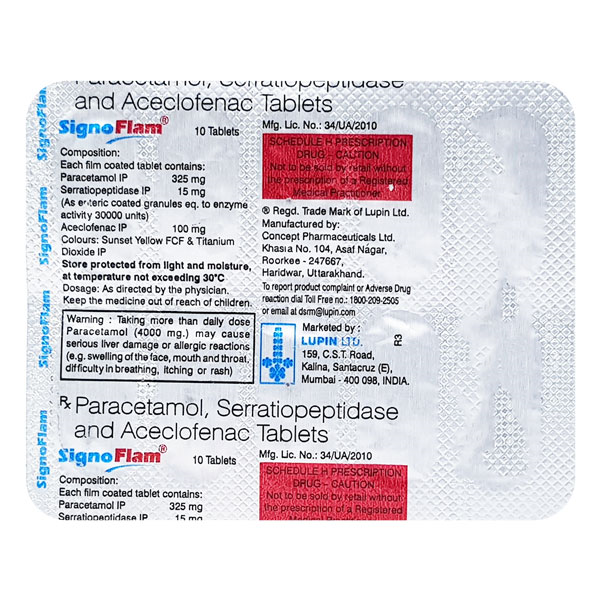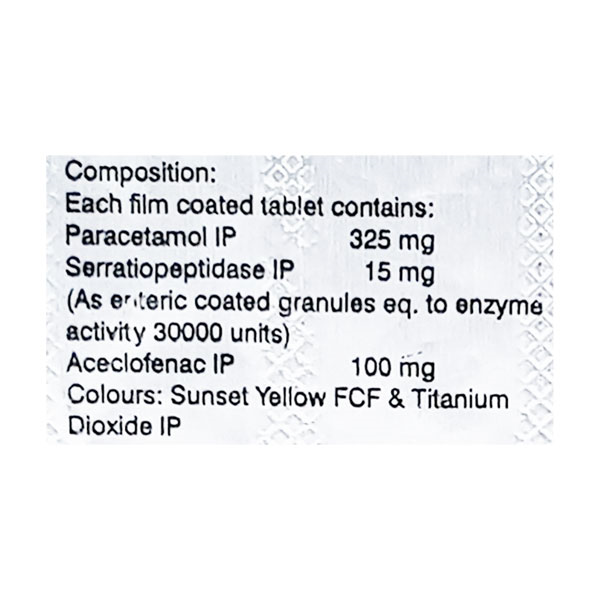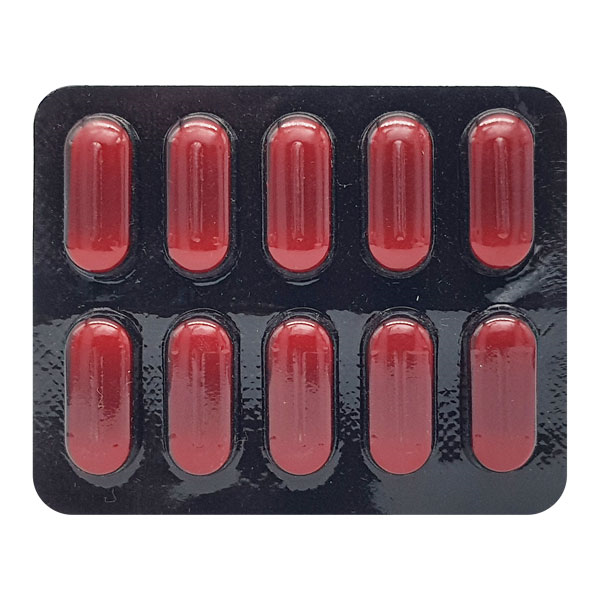Signoflam Tablet 10'S
ACECLOFENAC 100MG+PARACETAMOL(ACETAMINOPHEN) 325 mg+SERRATIOPEPTIDASE 15 MG
₹ 133.00
₹148
(Inclusive of all taxes)
-

No Warranty
-

COD Avilable
-

Non Returnable
-

cancelable
About this item
INTRODUCTION ABOUT SIGNOFLAM TABLET
SIGNOFLAM TABLET is used to relieve inflammation and pain due to bone and soft tissue injuries in affected individuals. It is also used to reduce high temperatures and provide relief from cold (while sneezing) in affected individuals. This medicine is also indicated for use to resolve post-operative inflammation, oedema, and pain. It is also used to provide relief from illnesses such as headaches, moderate migraines, and musculoskeletal pain.
SIGNOFLAM TABLET is a combination of Aceclofenac, Paracetamol, and Serratiopeptidase, which belong to the group of medicines called Nonsteroidal anti-inflammatory agents, Analgesics and Antipyretics, and Proteolytic enzymes, respectively. It helps to reduce pain and inflammation by blocking certain chemical messengers in the brain, and it also promotes healing by breaking down abnormal proteins at the site of inflammation, thereby healing the infected site.
SIGNOFLAM TABLET is not recommended for use in patients allergic to Aceclofenac, Paracetamol, or Serratiopeptidase. It is also not recommended for use in patients with active or recurrent peptic ulcers or haemorrhages (bleeding), severe heart, liver, or kidney diseases. Before taking SIGNOFLAM TABLET, inform your doctor if you suffer from uncontrolled high blood pressure, diabetes, hyperlipidaemia (high-fat level in the blood), gastrointestinal diseases such as ulcerative colitis (inflammatory bowel disease), and/or aseptic meningitis (inflammation of the brain).
SIGNOFLAM TABLET is not recommended for use by pregnant and breastfeeding women. It is also not recommended for use in children and adolescents (below 18 years old). Consult your doctor before taking the medicine. The most common side effects of taking SIGNOFLAM TABLET are abdominal pain, nausea, vomiting, diarrhea, flatulence, constipation, indigestion, and/or dizziness. Consult and inform your doctor if any of these side effects get worse.
USES OF SIGNOFLAM TABLET
It is used to:
- Provides relief from inflammation and pain due to bone and soft tissue injuries
- Reduces fever and provides relief from cold, post-operative inflammation, oedema, and pain
- Relief from illnesses such as headaches, moderate migraines, and musculoskeletal pain
HOW SIGNOFLAM TABLET WORKS
SIGNOFLAM TABLET helps to reduce inflammation and provides relief from pain. Aceclofenac and paracetamol reduce pain and fever by blocking certain chemical messengers in the brain, and serratiopeptidase promotes healing by breaking down abnormal proteins at the site of inflammation, thereby healing the infected site.
DIRECTIONS FOR USE
Take SIGNOFLAM TABLET as advised by your physician. Swallow SIGNOFLAM TABLET with a glass of water, and do not chew or crush the medicine. Your doctor will decide the correct dose and duration for you depending on your age, body weight, and disease condition.
SIDE EFFECTS OF SIGNOFLAM TABLET
COMMON
- Abdominal pain, nausea, vomiting, diarrhea, flatulence, constipation, and indigestion
- Dizziness, drowsiness
- Stomach upset
- Lack of appetite
UNCOMMON
- Inflammation of the stomach
- Inflamed skin, itchy skin, red itchy welts, rash
- Nephrotoxicity (deterioration of the kidney due to drugs) includes interstitial nephritis (kidney disorder), nephritic syndrome (kidney disease marked by blood in urine), and renal failure
- Abnormal liver function, an inflamed liver, and signs of jaundice such as yellowing of the eyes and skin
- Neurological effects such as visual disturbances, optic neuritis (inflammation of the optic nerve of the eye), headaches, paraesthesia (abnormal sensation), and reports of aseptic meningitis (inflammation of the brain) are especially common in patients with existing autoimmune disorders, such as sle and mixed connective tissue disorders, with symptoms( such as stiff neck, headache, nausea, vomiting, fever or disorientation, depression, confusion, hallucinations, tinnitus, vertigo, dizziness, malaise, fatigue, and drowsiness)
- Haematological effects such as thrombocytopenia (low platelet level), neutropenia (low white blood cell count), agranulocytosis (a condition marked by an inability to make white blood cells), aplastic anemia (bone marrow disorder), and hemolytic anemia (red blood cell count)
RARE
- Signs of exfoliative and bullous dermatoses (autoimmune skin disorders), including epidermal necrolysis and erythema multiforme, such as lesions that crust over, areas of thickened skin, fever, and weakness
- Anaemia, signs of vasculitis (inflammation of blood vessels), such as fever, weakness, and weight loss
- Signs of anaphylactic reaction (a life-threatening allergic reaction) such as lightheadedness, wheezing, and a fast heartbeat
- Face swelling, visual disturbance, shortness of breath
- Skin rash with disease or fever
Stop taking SIGNOFLAM TABLET and contact your doctor if you experience any of the following side effects:
- Signs of serious skin reactions (exfoliative dermatitis, Stevens-Johnson syndrome, and toxic epidermal necrolysis) such as skin rash and mucosal lesions
HOW TO MANAGE SIDE EFFECTS
Constipation
Increase fiber intake through fruits, vegetables, and whole grains. Stay hydrated by drinking plenty of water. Maintain regular meal times and avoid skipping meals. Exercise regularly to promote bowel movements. Establish a bathroom routine and avoid ignoring the urge to go. Avoid processed foods and prioritize probiotic-rich foods for gut health. Consult your doctor if constipation persists.
Diarrhea
Drink plenty of clear fluids, like water, diluted fruit juices, or oral rehydration solutions, to stay hydrated. Avoid caffeinated or alcoholic beverages, as they can worsen dehydration. Gradually take bland, low-fiber foods like bananas, rice, applesauce, and toast to help firm up stools. Probiotics, found in yogurt or supplements, may help restore the balance of gut bacteria. Practice good hand hygiene to prevent the spread of infection. Consult your doctor if diarrhea worsens.
Dizziness Or Drowsiness
Ensure proper hydration, as dehydration can cause dizziness. Avoid excessive caffeine, alcohol, and high-sodium foods, which can exacerbate symptoms. Engage in physical therapy or vestibular rehabilitation exercises designed to improve balance and reduce dizziness. Move slowly when changing positions, such as standing up or lying down, to avoid triggering dizziness. Practice relaxation techniques such as deep breathing, meditation, or yoga to manage stress, which can contribute to dizziness. Consult your doctor if dizziness persists.
Indigestion
Avoid trigger foods such as fatty, spicy, or acidic items. Eating slowly, chewing food thoroughly, and avoiding lying down immediately after meals can improve digestion. Reduce stress through relaxation techniques like meditation, yoga, or deep breathing, which can alleviate symptoms. Maintaining a healthy weight, quitting smoking, and limiting alcohol consumption are also beneficial. Drinking plenty of water helps digestion. Engaging in regular physical activity can help keep the digestive system active and reduce stress, which may improve symptoms. Consult your doctor if indigestion persists.
Nausea And Vomiting
Stay hydrated with small sips of clear fluids like water, ginger ale, or electrolyte solutions. Avoid consuming large meals; instead, opt for bland, easy-to-digest foods. Ginger, peppermint, or chamomile tea may help soothe the stomach. Rest in a comfortable position, preferably with your head elevated, to ease symptoms. Consult your doctor if nausea and vomiting persist.
WARNING & PRECAUTIONS
PREGNANCY
ContraindicatedSIGNOFLAM TABLET is not recommended for use by pregnant women. Consult your doctor before taking the medicine.
BREASTFEEDING
ContraindicatedSIGNOFLAM TABLET is not recommended for use in breast-feeding women as it may pass through the breast milk. Consult your doctor before taking the medicine.
DRIVING AND USING MACHINES
ContraindicatedDo not drive or operate any machines, as you may feel dizzy after taking SIGNOFLAM TABLET.
ALCOHOL
ContraindicatedAvoid consumption of alcohol while taking SIGNOFLAM TABLET, as it may cause liver damage.
KIDNEY
ContraindicatedSIGNOFLAM TABLET is not recommended for use in patients with moderate and severe renal impairment. Consult your doctor before taking the medicine.
LIVER
Consult your doctorSIGNOFLAM TABLET is not recommended for use in patients with severe liver impairment. It should be used with caution in patients with liver disease such as mild to moderate hepatic impairment, hepatic porphyria (a genetic disorder). Consult your doctor before taking the medicine.
ALLERGY
ContraindicatedDo not take SIGNOFLAM TABLET if you are allergic to Aceclofenac, Paracetamol, Serratiopeptidase, and/or any other ingredients of this medicine.
LUNGS
Use with CautionSIGNOFLAM TABLET should be used with caution in patients who have or have had a history of bronchial asthma. Consult your doctor before taking the medicine.
HEART DISEASE
Consult your doctorSIGNOFLAM TABLET is not recommended for use in patients with severe heart disease. It should be used with caution in patients with mild-to-moderate congestive heart failure, ischaemic heart disease, peripheral arterial disease, and/or cerebrovascular disease. Consult your doctor before taking the medicine.
USE IN PEDIATRICS
ContraindicatedSIGNOFLAM TABLET is not recommended for use in children and adolescents (below 18 years). Consult your doctor before taking it.
USE IN GERIATRICS
Use with CautionSIGNOFLAM TABLET should be used with caution with elderly patients. Consult your doctor before taking SIGNOFLAM TABLET.
OTHERS
SIGNOFLAM TABLET is not recommended for use if you:
- Have a history of or an active, recurrent peptic ulcer or hemorrhage (bleeding)
- Have previously shown hypersensitive reactions to ibuprofen, aspirin, or other NSAIDs
- Have a previous history of an anaphylactic reaction
- Suffer from severe hypertension (high blood pressure)
Before taking SIGNOFLAM TABLET, inform your doctor if you:
- Have uncontrolled high blood pressure
- Have diabetes
- Are a smoker
- Suffer from hyperlipidemia
- Have gastrointestinal bleeding, ulceration, or perforation
- Have gastrointestinal diseases such as ulcerative colitis (inflammatory bowel disease)
- Have systemic lupus erythematosus (autoimmune disorder)
- Have mixed connective tissue disorders such as scleroderma and polymyositis
- Have aseptic meningitis (inflammation of the brain)
- Have bleeding disorders such as hemophilia, von Willebrand disease
- Have signs of cerebrovascular bleeding, such as sudden, severe headaches or seizures
- Are on diuretic therapy
INTERACTIONS
A. Drug-Drug Interactions:
- NSAIDs (Ex. aspirin, naproxen, rofecoxib, ibuprofen, and diclofenac)
- Antihypertensives (Ex. atenolol, metoprolol)
- Diuretics (Ex. chlorothiazide, chlorthalidone)
- Cardiac glycosides (Ex. digoxin)
- Anti-manic (Ex. lithium)
- Anti-rheumatic (Ex. methotrexate)
- Immunosuppressants (Ex. ciclosporin and tacrolimus)
- Anti-progestational steroids (Ex. mifepristone)
- Corticosteroids (Ex. cortisone, prednisone, and prednisolone)
- Anticoagulants (Ex. warfarin, rivaroxaban, dalteparin, enoxaparin, heparin, and dabigatran)
- Antibiotics (Ex. ciprofloxacin and chloramphenicol)
- Anti-retroviral (Ex. zidovudine)
- Antidiabetic agents (Ex. biguanides, sulfonylureas)
- Antiglaucoma agents (Ex. acetazolamide)
- Anti-gout (Ex. probenecid)
- Antiepileptic medicines (Ex. phenytoin, phenobarbital, carbamazepine)
- Anti-tubercular (Ex. rifampicin)
- Anti-depressant (Ex. St. John's wort)
- Anti-platelet (Ex. clopidogrel)
Overdosage:
If you or anyone else accidentally takes too much of SIGNOFLAM TABLET, consult your doctor immediately or visit the nearby hospital. Symptoms of an overdose are headache, pallor, nausea, vomiting, epigastric pain, gastrointestinal irritation and bleeding, diarrhea, disorientation, excitation, drowsiness, dizziness, tinnitus, hypotension, respiratory depression, fainting, convulsions, anorexia, and/or abdominal pain.
SYNOPSIS
| Drug | : | Aceclofenac, Paracetamol, and Serratiopeptidase |
| Pharmacological Category | : | Nonsteroidal anti-inflammatory drugs, Analgesics and Antipyretics, Proteolytic enzymes |
| Therapeutic Indication | : | Inflammation and pain (due to bone and soft tissue injury), Fever, Postoperative inflammation, oedema, and Pain |
| Dosage Forms | : | Tablet |
MORE INFORMATION
STORAGE
- Keep the medicine out of the reach of children
- Store SIGNOFLAM TABLET at room temperature
0 Review Of Product Signoflam Tablet 10'S















